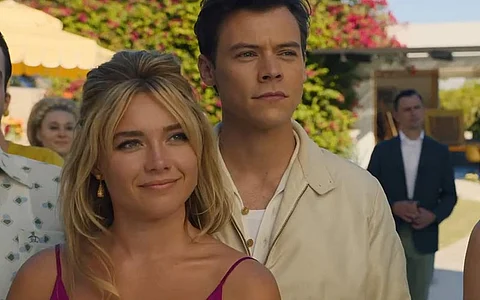
- Reviews
- Power List 2024
- Cannes 2024
- In-Depth Stories
- Web Stories
- News
- FC Lists
- Interviews
- Features
- FC SpecialsFC Specials

As global popstar and articulate philosopher Harry Styles once said, “Don’t Worry Darling is a movie that feels like a movie.” A lot of movies, if we’re being accurate. Olivia Wilde’s follow-up to her warmly comedic debut Booksmart (2019) is a pastiche of well-known films, borrowed storylines and familiar tropes that dares to ask: What if Stepford Wives (1975) but with nothing new to say about gender relations? What if the creepy mirror shot from Black Swan (2010), a film with which it shares cinematographer Matthew Libatique? What if The Matrix (1999) but for incels? What if the patriarchy…bad?
A thriller that’s largely inert for much of its runtime, the film is a mass of similar contradictions. It withholds information but does little to invite curiosity. It bursts with expressive imagery that makes little-to-no sense narratively. And it’s billed as a movie about female pleasure — “Men don’t come in this film. Only women here!” Wilde told Variety earlier this year — though the implications of its twist are horrifying, bluntly recasting its sex scenes as brutal bodily violations instead. That the reality of the film is vastly different from the vision it was sold as is bleakly ironic, given its plot.
Set in the Fifties' town of Victory, a bright, manicured suburb surrounded by a sprawling desert, Don’t Worry Darling follows housewife Alice (Florence Pugh), who dotes on her husband Jack (Styles). (Repetitive shots of coffee being poured, bacon sizzling and butter being smeared on toast are one of the movie’s more effective use of visuals, conveying the crushing tedium of her routine, which only grows more oppressive as the film continues.) Jack’s job, like that of every other man in town working for the Victory Project, involves the “development of progessive materials”, a descriptor that’s as vague as it is ominous. It doesn’t take long for the blissfully wedded Alice to realise something’s off, though the lack of explanation for what really triggers her discontent and the hurried eagerness with which the film introduces some of its eerier visuals dilutes their impact.
It’s only towards the second half that the film really gets going, ratcheting up the tension with a superb across-the-table confrontation between Alice and Victory founder Frank (Chris Pine, all unruffled menace). Until then, viewers must grapple with stilted dialogue, confounding plot beats that make it seem like large chunks of the film were mistakenly left on the edit table and character motivations that don’t hold up to scrutiny.
Writing a thriller in the Extremely Online age is its own puzzle-box — internet communities and fan theorists pride themselves on anticipating, predicting and “solving” films and shows much before they’re out — but the degree to which Don’t Worry Darling pivots to obviousness, both narrative and thematic, is frustrating. Pugh is reliably excellent, drawing on the woman-on-the-verge act she perfected in her breakthrough Midsommar (2019), while Wilde has fun as her chain-smoking neighbour Bunny (characters named Alice and Bunny in a film about a wonderland — see the obviousness?) Styles is fine, though he falters in the big dramatic moments handed to his character, unable to summon the fearful rage and violent desperation of a man driven to depravity.
Plot holes and unanswered questions will nag at you once Don’t Worry Darling ends — What’s the deal with the plane Alice sees? How does the frenzied, monochromatic imagery of ballet dancers fit into the larger scheme of things? What makes the men so much more susceptible to fatalities than the women? And yet, this is a film that will dissipate from your consciousness the moment you leave the theatre, a vision as flimsy and hollow as any sold by the Victory project.